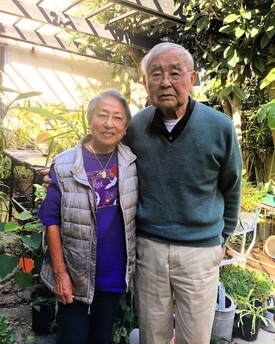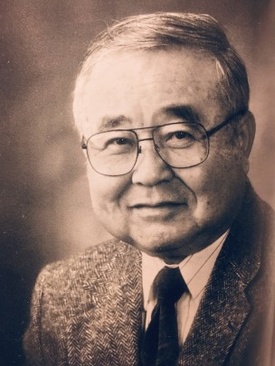“My mom just about died in camp that first year because it was so damn hot. And I remember I used to have to go to the canteen every day. And they kept saying, ‘Hey get your ass out of here. We’re ain’t going to give you anymore ice.’ But everybody suffered if they weren’t used to the heat. So mom just about perished, died.”
— Jack Fujimoto
When you listen to Jack and Grace Fujimoto talk, you can’t help but know you’re in the presence of an incredibly rare couple. Having been married now for over sixty years, as teenagers they were a part of the rebuilding of Sawtelle’s Japantown (the Japantown of West Los Angeles), meeting by chance when Jack was pumping gas and Grace needed to refuel. Grace’s family owned the Sawtelle Fish Market, while Jack worked five jobs to pay his way through college at UCLA. They flitter in and out of speaking Japanese—an even rarer thing to hear today—and still keep active in community events. Their affection and care for each other is palpable, as Jack dedicated the historical pictorial book he wrote on Sawtelle Japantown to Grace and her family.
But when it comes to Jack himself, you would be completely unable to glean his vast array of contributions to the Japanese American community just by talking to him: Not only was he the first Asian American to become President of a higher education institution on the U.S. mainland, his academic, cultural, and language preservation work earned him Japan’s Order of the Rising Sun award in 2011. But all of that is completely left out during our conversation.
Instead we talk about each of their families, and reflect on the legacy of the dispersed Japanese American community today and where it’s going in the future. Jack also can’t help but remind and gently tease Grace about their courtship. In short, they are a wealth of knowledge and wonderfully down-to-earth.
[To Jack] So I know you’re very involved in the Nikkei community here. So how have you seen it sort of transform or change, even from post-war until now? Like taking Sawtelle, for example, as a Japanese American hub.
Jack Fujimoto: It’s pretty much disappeared, the JA hub. Two years ago the LA city council recognized Sawtelle Japantown but it’s sort of the tail-end. Sawtelle in the 20s and 30s, it was sort of a ghetto. Westwood was here, Bel-Air was there, Brentwood is over there, Pacific Palisades, and they says, ‘OK Jap, come and take care of my grass, take care of my landscape, but you live over here.’ Redlined and all that.
And then after the war they became much more entrepreneurial because the Nisei came out before World War Two. It was the Nisei that said, “Arigato.” Kibei and Nisei and that was the thing to do. Go to Japan and get educated. Start a business or work for a business or whatever. But you come back and what do you do? Gardening, market, things like that. But you’re always subservient to your Issei dad.
So then WWII comes along and after the war, the Issei, many of them had desires to go back to Japan, make their gold mountain here and then go back to Japan to live. And be sort of like the kingpin in the village saying, ‘Yeah, I went to America I made a lot of money.’ Even though they didn’t make anything. That was my grandfather. He went back to Japan from here and he took his family, two boys and two girls. Anyway took them back and he didn’t have any money and yet, he poured out money to different people in the small village as if he was a kingpin.
What was his job here? What was he doing?
Jack: I don’t know. He had a laundry. He made geta [footwear]. Because I remember my uncle lit fire to the laundry. He was a little old brat you know. Make chaos all over the community and so he’d take a fire and burn somebody’s shirt and grandpa or grandma would have to run over and apologize. He was good at making geta because he didn’t have any shoes. In other words, they survived the best way they could best. A lot of it was just farming.
What prefecture were they from?
Jack: Hiroshima. Yes so he went back to Japan. Acting like a big old kingpin. He had some kind of disease. But he was an alcoholic, too. He liked to drink. So he didn’t last very long. And Grandma, when I went in 1950 I right after the Korean War started, I talked to my grandma. I talked to her for a long time. Delightful lady. She brought up the kids. Shipped them back here in 1924, that time period when the anti-Japanese legislation came on. So they returned here and stayed with the Yokoyama family and the old man got mad and said, “I can’t support all these women here. The two sisters. ‘So, you go get married. You go get married.’ So that’s how my dad got married to one. And then the other daughter to another family.
So it was the desire of all the people or most of the people to go back to Japan with gold mountain. And, when you think about it, what the hell are they’re going to go back to? What are they going to be doing? They’re still young yet, they’ve got a whole life ahead of them, then they got a war coming on or whatever.
But in the ’70s, Japan was ruling the world economically so it was great. But right after ’45 people got out of camp but there was nothing. They had to build. And it was the Nisei that built. And the JACL was all Nisei, they wouldn’t accept an Issei. So there was a lot of resentment against the JACL. Because no Issei could do anything with JACL.
I didn’t know that. So they purposely kept the Issei out?
Jack: The Nisei kept the Issei out. That’s why like, the Manzanar riot, the Kibei guys ganged up on the JACL people, they were all Nisei. Same thing in the Poston riot. These riots were all prompted against the JACL because they were Nisei. But see before the war it was always the Nisei subservient to the Issei. That’s to me anyway, that’s my interpretation. Then the next thing is right after camp, the people came out and the Issei couldn’t speak English. So how are they going to go and live? They have to go to a boarding house. How did they negotiate in the boarding house? Or how are they going to go and buy something? Then the Nisei then had to come out of their shell and say, ‘Okay, Dad. Get lost, I’ll take care of it.’
And that’s why Sawtelle really was a boomtown. Sawtelle was really important in the late ’40s and ’50s. Then come about ’65 when the big wave of shin-Issei, new Issei coming in because they were getting the prelude to ’70 boons for the Japanese.
So for me, the ’50s and ’60s were great times because I got into academics and my dad said, ‘You’re no farmer. You ain’t going to succeed in farming. So you better use your head. I won’t give you any money I don’t have any.’ Because when they came out of camp they had nothing. So then I went into academics.
So you yourself, your family was where? Were you in the L.A. area?
Jack: No I’m San Diego, Northern San Diego. My dad and his brother both were strawberry farmers. So then we went into camp with three cousins.
And you have a family of six, you were the oldest?
Jack: Yeah.
We’re sort of like two families because me, my older sister and second sister, we were all born in the ’20s and ’30s. And the three others, Tak came along in ’39, Judy in ’40, and Eiko in ’45. We’re like two families. We really don’t know each other that well. That’s why when Tak became this famous cinematographer and all that, we didn’t talk.
Not super close with the younger siblings.
Jack: No. My dad sort of took a little different turn when he was raising us. He wanted me to go to Japan. Become a Kibei. Go get educated, come back here, do whatever you want. But with Tak, young kid. Two or three years old when he went to camp. My father wanted to be the block manager, he became the block manager. He lost all interest in going back to Japan. He flipped around and became much more American. And so the three younger kids, they grew up American. They don’t know Japan at all. They don’t know kanji, they don’t know hiragana or any of the language. And they can listen. My dad and mom can’t speak English but at least they can understand.
So that happened in camp?
Jack: Before camp because when Tak went into camp, Judy went into camp, my mom just about died in camp that first year because it was so damn hot. And I remember I used to have to go to the canteen every day. And they kept saying, ‘Hey get your ass out of here. We’re ain’t going to give you anymore ice.’ But everybody suffered if they weren’t used to the heat. So mom just about perished, died.
So if your Dad made this switch in his raising of you, was that because he knew the war was happening and he thought, ‘We’d better really assimilate or better assimilate these younger children?’ Or what do you think that was.
Jack: Well in my case, seeing he already wanted me to go to Japan. I was already 12 years old, 1940. He wanted me to go to Japan and get an education. Me and my cousin. It’s a good thing we didn’t go.
Yeah. You would’ve been stuck.
Jack: We would’ve been stuck, right. I would’ve been conscripted for the Army, then we’d be suffering and all that. So it’s a good decision saying that, ‘We don’t have any money to send you.’
But he wanted that initially.
Jack: Yeah, that’s what he wanted. So his views were pro-Japan.
During the war too or throughout?
Jack: Just sort of at the beginning of the war when Japan was winning. Then, it changed. And he became the block manager. He’d start talking for the community of the block. You know there are 16 barracks in a block and he became a spokesperson for that. And then he started building ponds and bridges you know to beautify the block? And then my uncle, my father’s older brother was very craft-oriented so he’d take mesquite and make bird pins, make different kinds of crafts. And he’d build bridges, go fishing. So they became much more Americanized. In other words the whole view of pro-Japan changed to not anti-Japan but pro-American.
It was like a sense of self-preservation too. But it’s sad because it took away the identity of the Issei or the Kibei that felt like they didn’t have a say anymore.
Jack: That’s right. That’s why in camp, they make a big noise about those that went to the army, 442, 100th, and glorify them. And then there were people that said, ‘Well, I don’t understand anything about worship of the Emperor. Loyalty to the Emperor. And so you have that Frank Emi, and no-no resistance group, and Tule Lake became a segregation camp. So you know you get the divide among the Japanese. It’s an interesting period of Japanese American history. That’s why what you’re doing is very exciting, I think.
* This article was originally published on Tesssaku on November 27, 2018.
© 2018 Emiko Tsuchida








